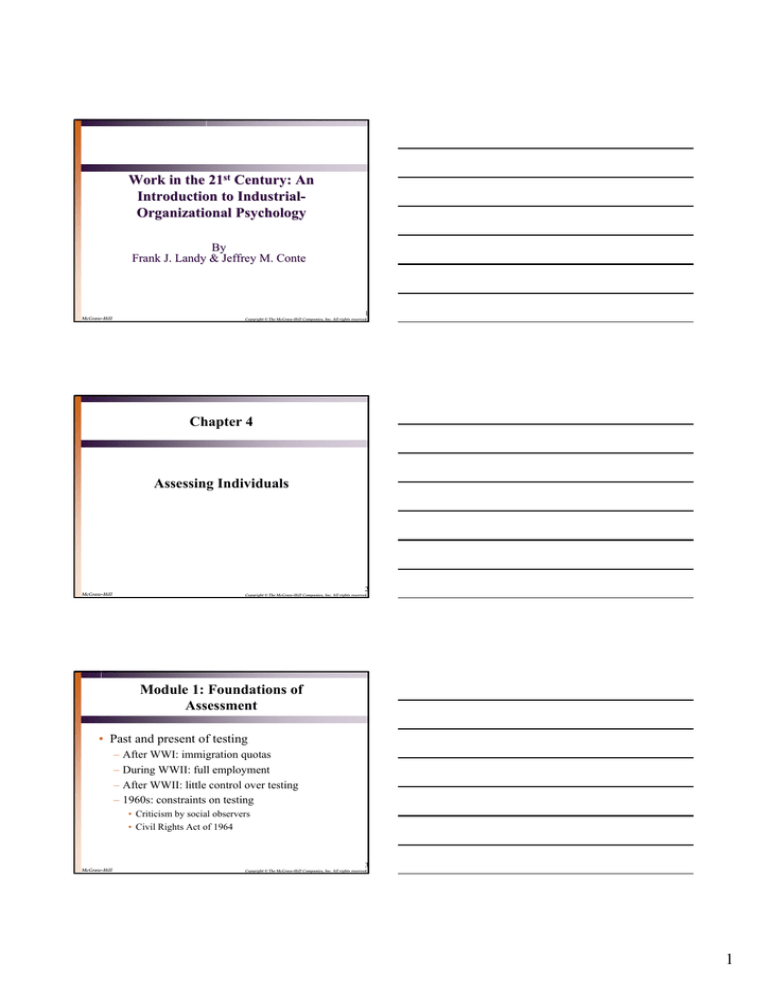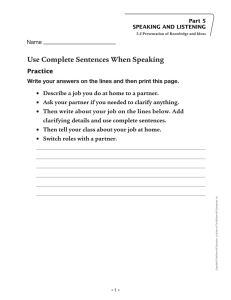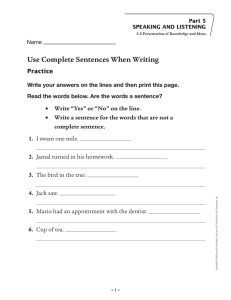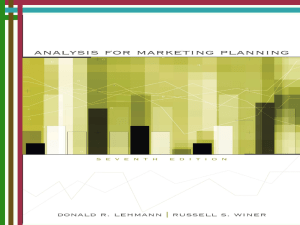
Work in the 21st Century: An
Introduction to IndustrialIndustrialOrganizational Psychology
By
Frank J. Landy & Jeffrey M. Conte
McGraw-Hill
1
Copyright © The McGraw-Hill Companies, Inc. All rights reserved.
Chapter 4
Assessing Individuals
McGraw-Hill
2
Copyright © The McGraw-Hill Companies, Inc. All rights reserved.
Module 1: Foundations of
Assessment
• Past and present of testing
– After WWI: immigration quotas
– During WWII: full employment
– After WWII: little control over testing
– 1960s: constraints on testing
• Criticism by social observers
• Civil Rights Act of 1964
McGraw-Hill
3
Copyright © The McGraw-Hill Companies, Inc. All rights reserved.
1
Module 1 (continued)
• What is a test?
– Attributes to be assessed
– Ways to assess attributes
CONTENT
PROCESS
• What is the meaning of a test score?
– Norming
• Test users and test interpretation
4
McGraw-Hill
Copyright © The McGraw-Hill Companies, Inc. All rights reserved.
Module 1 (continued)
• What is a test battery?
• Administrative test categories
– Speed vs. power tests
– Group vs. individual tests
– Paper and pencil vs. performance tests
– Where to find tests
McGraw-Hill
5
Copyright © The McGraw-Hill Companies, Inc. All rights reserved.
Two Different Procedures to
Measure Two Attributes
McGraw-Hill
6
Copyright © The McGraw-Hill Companies, Inc. All rights reserved.
2
Module 1 (continued)
• Testing and culture
• Bias
• Fairness
• Culture
7
McGraw-Hill
Copyright © The McGraw-Hill Companies, Inc. All rights reserved.
Module 2: Traditional
Assessment Procedures
• Procedures for assessing abilities
– Cognitive ability tests
• Tests that produce a single score
• Tests of specific abilities
• Cognitive test batteries
– Knowledge tests
– Tests of physical abilities
– Tests of psychomotor abilities
McGraw-Hill
8
Copyright © The McGraw-Hill Companies, Inc. All rights reserved.
Cognitive Ability Tests
Sample item from
the Bennett
Mechanical
Comprehension Test
McGraw-Hill
9
Copyright © The McGraw-Hill Companies, Inc. All rights reserved.
3
Module 2 (continued)
• Personality
• Screen out tests and screen in tests
• Emotional intelligence
• Interests and values
10
McGraw-Hill
Copyright © The McGraw-Hill Companies, Inc. All rights reserved.
Occupational Personality
Questionnaire (OPQ32)
11
McGraw-Hill
Copyright © The McGraw-Hill Companies, Inc. All rights reserved.
Module 3: Additional
Assessment Methods
• Content vs. process
• Individual assessment
– Interactive assessment tools
– Criticisms
McGraw-Hill
12
Copyright © The McGraw-Hill Companies, Inc. All rights reserved.
4
Candidate Comparison Matrix
13
McGraw-Hill
Copyright © The McGraw-Hill Companies, Inc. All rights reserved.
Module 3 (continued)
• Interviews
– Interview content
• Situational interview
• Structured interview
• Unstructured interview
– Interview process
McGraw-Hill
14
Copyright © The McGraw-Hill Companies, Inc. All rights reserved.
Module 3 (continued)
• Assessment centers
• Work samples and situational tests
• Biographical data
– Ecology model
– Characteristics of biodata items
• Grades and letters of recommendation
McGraw-Hill
15
Copyright © The McGraw-Hill Companies, Inc. All rights reserved.
5
Module 4: Special Topics in
Assessment
• Incremental validity
• Controversial assessment practices
– Graphology
– Polygraph
• Drug and alcohol testing
– Drug Free Workplace Act
16
McGraw-Hill
Copyright © The McGraw-Hill Companies, Inc. All rights reserved.
Module 4 (Continued)
• Integrity testing
– Overt and personality based
– Concerns
• Computer based assessment
– Computer adaptive testing
McGraw-Hill
17
Copyright © The McGraw-Hill Companies, Inc. All rights reserved.
Computer Adaptive Testing
An example of the Routing Test
McGraw-Hill
18
Copyright © The McGraw-Hill Companies, Inc. All rights reserved.
6





